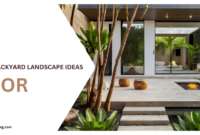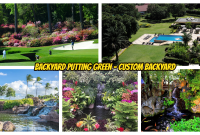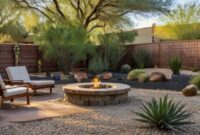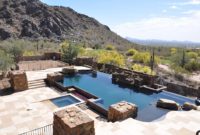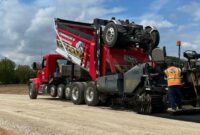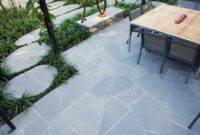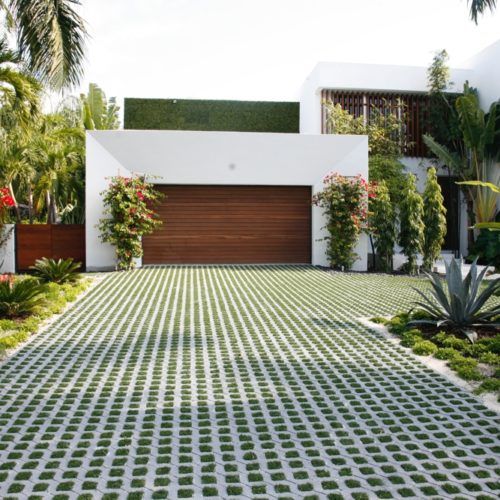
Permeable driveway paving is a sustainable and environmentally conscious solution for homeowners seeking to balance aesthetics with responsible land management. Unlike traditional impermeable driveways, which shed rainwater and can contribute to runoff and water pollution, permeable driveways are designed to allow water to pass through their surfaces. This innovative approach not only helps mitigate flooding and erosion but also minimizes the environmental impact associated with stormwater runoff by promoting natural groundwater recharge. With a wide range of materials and designs available, permeable driveways offer an attractive and eco-friendly option for homeowners looking to enhance the functionality and curb appeal of their properties while contributing to the conservation of our natural resources.
These driveways come in various styles, from grass pavers and gravel beds to permeable concrete and interlocking pavers, each offering unique aesthetics and drainage capabilities. Permeable driveway paving not only reduces water runoff but also promotes soil health, allowing grass and vegetation to thrive between the pavers or within the grid structures. This eco-friendly solution aligns with the growing trend of sustainable landscaping and is a testament to the shift toward more responsible land use practices in modern urban and suburban environments.
Permeable driveways are an excellent choice for homeowners who want to reduce runoff, minimize environmental impact, and create a visually appealing entrance to their property. Here are 15 of the best permeable driveway paving ideas to consider:
1. Grass Pavers:
Grass pavers are a type of permeable paving system designed to combine the benefits of traditional paving with the natural beauty of grass. These pavers consist of a grid-like structure made from materials such as concrete or plastic. The grids are filled with soil and grass seed, allowing vegetation to grow through the openings. Grass pavers offer an eco-friendly solution for driveways, parking areas, and pathways. They reduce stormwater runoff by permitting rainwater to infiltrate the ground, promoting groundwater recharge and minimizing soil erosion. This not only helps manage water effectively but also enhances the aesthetics of the outdoor space, providing a lush, green appearance while maintaining load-bearing capacity for vehicles.
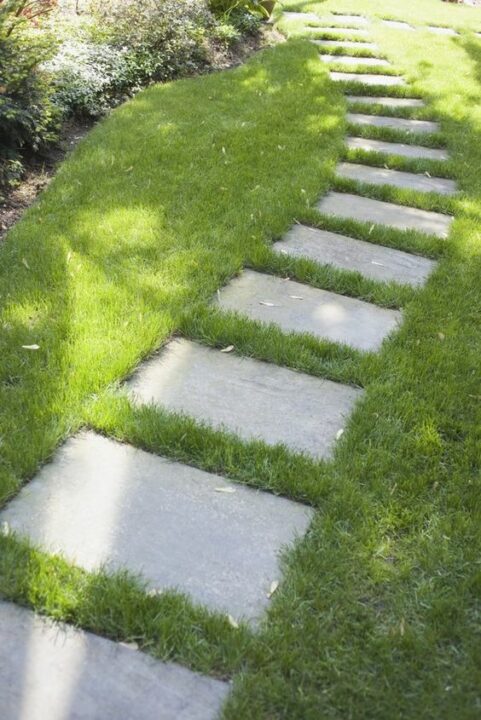
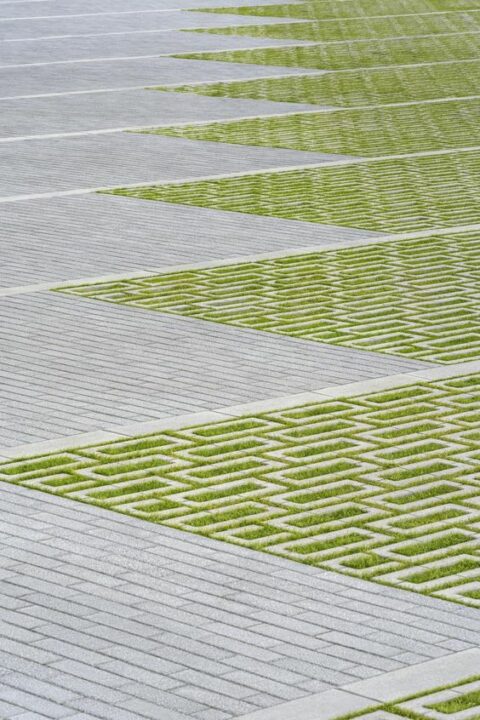
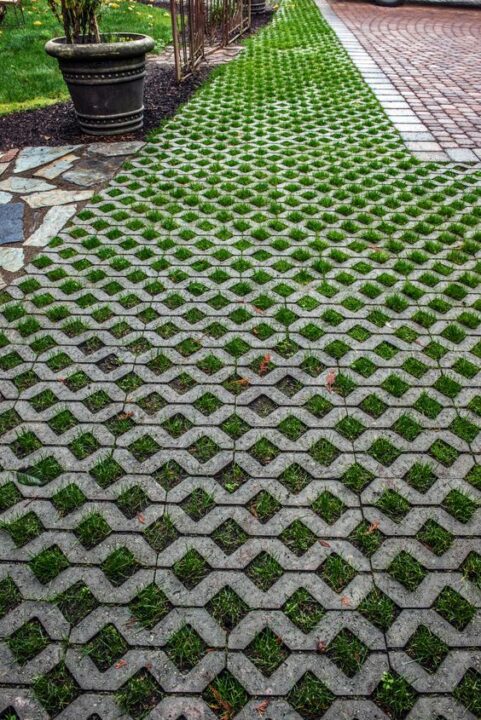
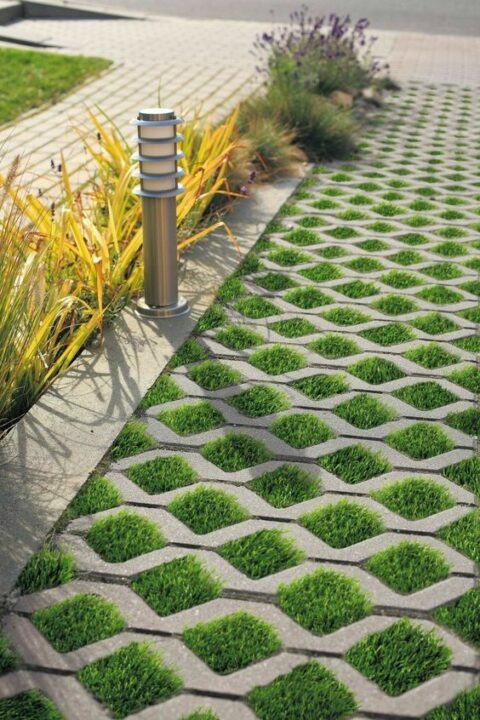
One of the key advantages of grass pavers is their versatility. They can be used in a variety of settings, from residential driveways to commercial parking lots and even in public spaces like parks and recreational areas. Grass pavers are also relatively low-maintenance, as the grass naturally filters pollutants and requires mowing less frequently compared to conventional lawns. The result is a visually pleasing, environmentally responsible solution that blends well with the surrounding landscape, making grass pavers a popular choice for those looking to combine functionality and sustainability in outdoor design.
2. Gravel Driveway
A gravel driveway is a popular choice for homeowners seeking a cost-effective and versatile solution for their driveway needs. Gravel driveways consist of a layer of small stones, often made from materials like crushed stone, shale, or granite, which are spread evenly over a prepared base. Gravel driveways offer several advantages, including excellent water permeability, natural aesthetics, and easy installation. Rainwater can quickly seep through the gaps between the gravel, reducing the risk of puddles and standing water, and minimizing erosion and runoff. This drainage capability is especially beneficial in regions with heavy rainfall, as it helps to prevent flooding and water damage to the property.
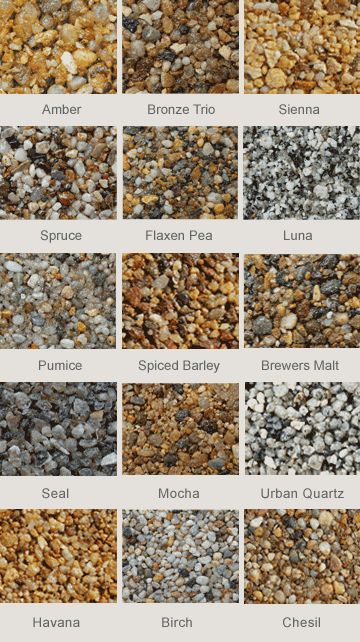
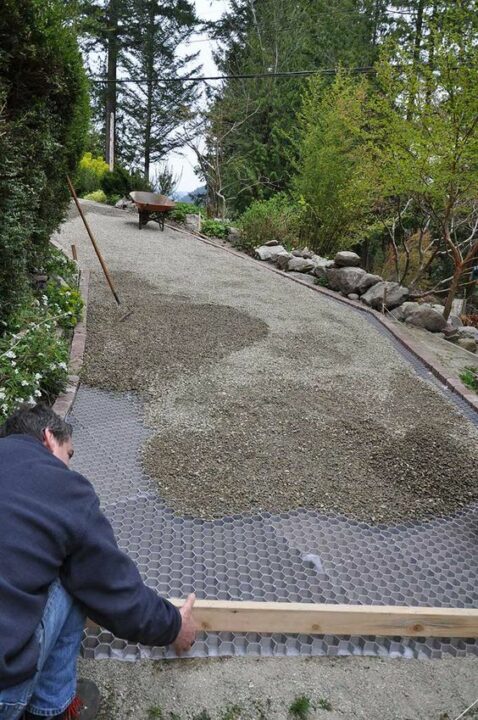
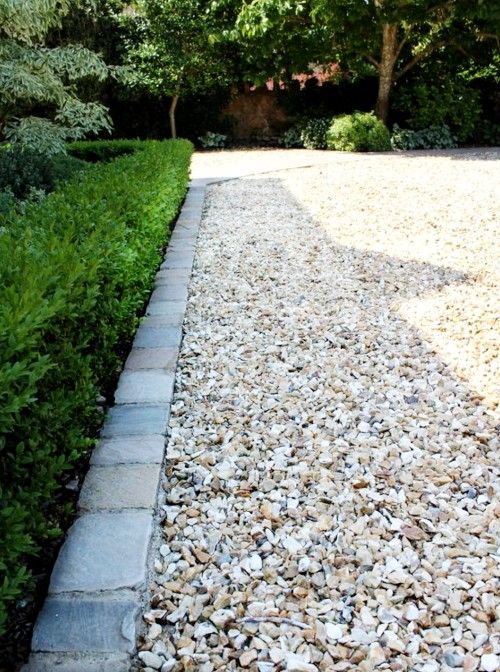
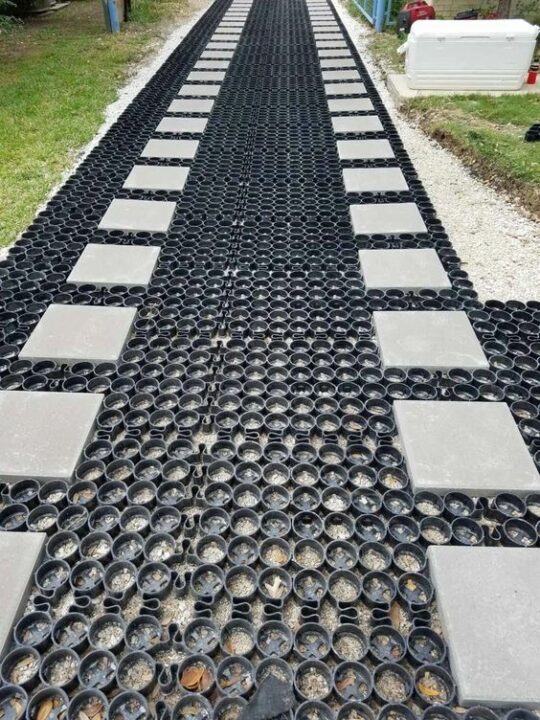
Gravel driveways come in various sizes and types of stones, allowing homeowners to customize their appearance to suit their preferences and the overall aesthetic of the property. They’re relatively easy to install or repair, and maintenance typically involves periodic re-grading and adding fresh gravel to maintain a smooth and even surface. Gravel driveways are also a budget-friendly option compared to some other paving materials, making them an attractive choice for those looking for a balance between functionality, affordability, and a rustic, natural look.
3. Permeable Concrete
Permeable concrete, also known as porous concrete or pervious concrete, is a specialized type of concrete designed to allow water to pass through its surface, rather than shedding it like traditional impermeable concrete. It is engineered to have a porous structure with interconnected voids that facilitate the infiltration of water into the ground. This innovative material offers several important environmental and functional benefits.
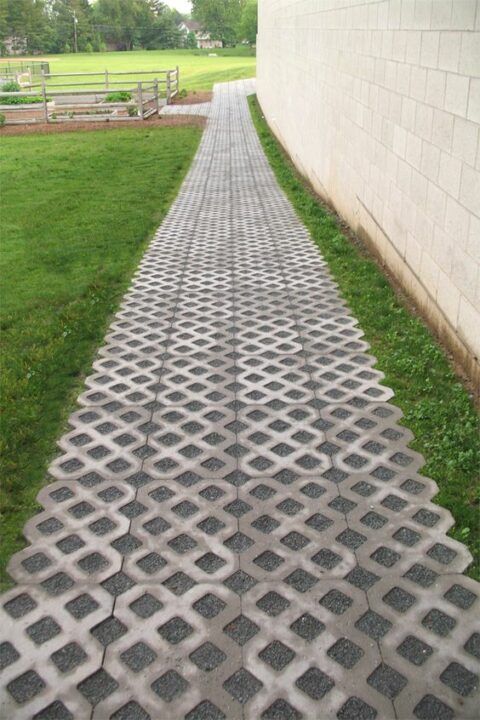
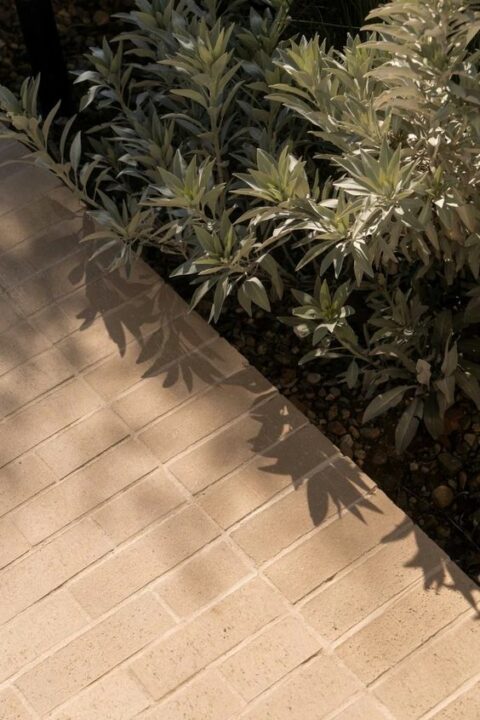
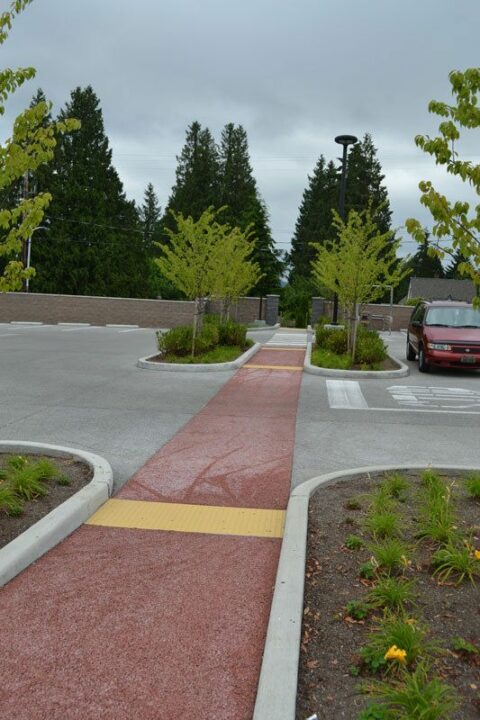
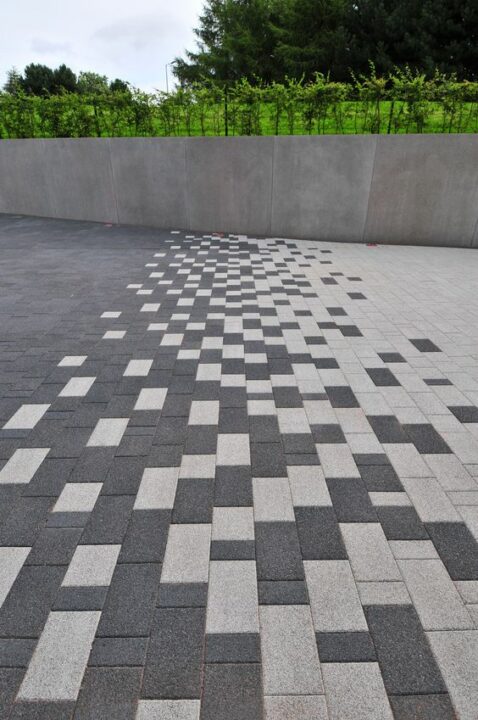
One of the primary advantages of permeable concrete is its ability to manage stormwater effectively. When used for driveways, parking lots, or sidewalks, it reduces surface runoff and minimizes the risk of flooding and erosion, as rainwater can percolate through the concrete and be naturally filtered by the soil below. This process not only helps replenish groundwater but also mitigates the harmful effects of urban development on local water systems by reducing pollution and thermal runoff. Moreover, permeable concrete promotes the growth of vegetation and maintains a more consistent temperature compared to traditional concrete, which can become excessively hot in direct sunlight. These qualities make it a valuable tool in sustainable urban planning and landscaping, contributing to a more eco-friendly and resilient built environment.
4. Brick Pavers
Brick pavers are a classic and versatile option for creating appealing, durable, and functional outdoor surfaces. These pavers are made from clay and come in various shapes, sizes, and colors, allowing for a wide range of design possibilities. They are commonly used for walkways, patios, driveways, and even as accents within larger landscaping projects.
One of the key advantages of brick pavers is their aesthetic appeal. They provide a timeless and charming look that can complement both traditional and modern architectural styles. The variety of patterns in which brick pavers can be laid, such as herringbone, basketweave, or running bond, allows for artistic and customized designs. Additionally, brick pavers are highly durable and require minimal maintenance. They can withstand heavy foot traffic and the weight of vehicles, making them a practical choice for driveways and high-traffic areas. Their permeable nature, with spaces between the bricks, also facilitates natural water drainage, reducing the risk of puddles and runoff. Overall, brick pavers are a popular choice for homeowners and landscapers seeking a combination of aesthetic appeal, durability, and functionality in outdoor design.
5. Interlocking Pavers
Interlocking pavers are a versatile and durable choice for hardscaping in outdoor spaces. These pavers are typically made from materials like concrete, stone, or brick and are designed with special interlocking features that allow them to fit tightly together. This interlocking design provides stability and strength, making interlocking pavers suitable for a wide range of applications, including driveways, walkways, patios, and even pool decks.
One of the primary advantages of interlocking pavers is their ease of installation and repair. Due to their modular nature, they can be laid in various patterns with minimal effort and expertise. If one paver becomes damaged or needs to be replaced, it can be done individually without disturbing the entire surface. This flexibility simplifies maintenance and reduces costs over time. Interlocking pavers are also known for their durability and load-bearing capacity, making them suitable for areas that experience heavy foot traffic or vehicle use. Additionally, the spaces between the pavers allow for efficient water drainage, reducing the risk of standing water and enhancing the longevity of the pavers. The variety of colors, shapes, and textures available in interlocking pavers makes them an attractive choice for creating visually appealing, functional outdoor spaces that can be customized to suit a wide range of design preferences.
Read also:
- 15 Best Reputable Driveway Paving Company in USA
- How to Lay Paving Stones in Easy Steps
- How Much Does Paving a Driveway Cost
6. Cobblestone Driveway
A cobblestone driveway is a classic and enduring choice that adds charm, character, and a touch of old-world elegance to a property’s entrance. Cobblestones are typically small, naturally rounded stones, often made from materials like granite, basalt, or limestone, that have been used for centuries in various construction projects, including driveways, streets, and walkways.
One of the distinctive features of cobblestone driveways is their timeless aesthetic appeal. The irregular shapes and earthy colors of cobblestones create a unique and picturesque look that complements both historic and contemporary architectural styles. These driveways exude a sense of durability and permanence, and when well-maintained, they can last for many years, enhancing a property’s curb appeal.
Cobblestone driveways can be installed in various patterns, including herringbone, basketweave, and running bond, allowing for artistic and customized designs. While they provide a rugged and textured surface, they may require more maintenance than some other driveway materials. Weeds or moss can grow between the cobblestones, which can add to their charm but may require occasional maintenance. Proper installation and a good foundation are crucial to ensure the stability and longevity of a cobblestone driveway, but the result is a distinctive and enduring feature that adds character and value to any property.
7. Recycled Glass Pavers
Recycled glass pavers are an eco-friendly and visually striking option for various outdoor applications. These pavers are made from post-consumer or post-industrial recycled glass materials, which are crushed, processed, and fused to create durable and colorful pavers. Recycled glass pavers are known for their unique appearance, sustainability, and versatility.
One of the standout features of recycled glass pavers is their aesthetic appeal. They come in a range of vibrant colors and can be used to create eye-catching designs, adding a pop of color and texture to outdoor spaces like patios, walkways, and even pool decks. The glass content in these pavers provides a luminous, reflective quality that can enhance the visual appeal of any area. Additionally, using recycled glass in these pavers diverts waste from landfills, making them an environmentally responsible choice that contributes to sustainability efforts. Recycled glass pavers are durable, resistant to UV radiation, and can withstand freeze-thaw cycles, ensuring their longevity in various climates. Their low maintenance requirements, ease of installation, and sustainable characteristics make them an attractive option for those looking to add a touch of eco-conscious style to their outdoor spaces.
8. Porcelain Pavers
Porcelain pavers are a modern and sophisticated choice for outdoor flooring and landscaping. Made from high-quality porcelain, these pavers offer a range of benefits that make them a popular option for patios, decks, walkways, and other exterior applications.
One of the key advantages of porcelain pavers is their exceptional durability. Porcelain is a non-porous material, which means it is highly resistant to staining, water absorption, and frost. This makes it well-suited for outdoor use, as it can withstand exposure to the elements and temperature fluctuations without cracking or fading. Additionally, porcelain pavers come in a wide variety of colors, textures, and sizes, allowing for versatile design possibilities. They can mimic the appearance of natural stone, wood, or concrete, providing an elegant and contemporary look for outdoor spaces.
Installation of porcelain pavers is typically straightforward, as they are uniform in shape and size, and they can be dry-laid or set in mortar. The ease of maintenance is another advantage, as these pavers require minimal care to maintain their appearance. Regular cleaning is usually sufficient to keep them looking pristine. Porcelain pavers are also known for their slip resistance, making them a safe choice for areas like pool decks. Overall, porcelain pavers offer a combination of aesthetic appeal, durability, and low maintenance that is appealing to homeowners and landscapers looking to create attractive and long-lasting outdoor spaces.
9. Decomposed Granite
Decomposed granite is a popular landscaping material known for its natural, rustic appearance and versatility. It is created by breaking down solid granite rock into small, fine particles over time, resulting in granular material that can be used for various outdoor projects.
One of the primary advantages of decomposed granite is its natural and earthy aesthetic. It comes in a range of colors, including brown, gray, and gold, and it has a textured, gravel-like appearance that can add a warm and inviting look to gardens, pathways, and other outdoor areas. It’s often used to create a casual, informal, and organic feel in landscapes.
Another key benefit of decomposed granite is its permeability. Water can easily infiltrate the loose particles, reducing runoff and the risk of erosion. This makes it an excellent choice for pathways, driveways, and other hardscaping projects where water drainage is important. While decomposed granite is relatively low-maintenance, it may need periodic replenishing or compacting to maintain a stable surface, making it a popular choice for homeowners and landscapers seeking a natural and water-friendly material for their outdoor designs.
10. Shell or Shingle Driveway
A shell or shingle driveway, often referred to as a crushed shell or crushed shingle driveway, is a distinctive and eco-friendly option for surfacing driveways, pathways, or garden areas. These driveways are created by spreading crushed shells or shingles over a prepared base, offering both a practical and aesthetic solution for outdoor spaces.
One of the distinctive features of shell or shingle driveways is their coastal and relaxed aesthetic. The crushed shells or shingles create a visually appealing surface with a natural, organic appearance. This texture is often associated with beachfront properties, creating a sense of tranquility and simplicity.
In addition to their visual appeal, shell or shingle driveways have other benefits. They are permeable, allowing rainwater to infiltrate the ground, which helps manage water runoff and minimize erosion. The natural materials used are typically locally sourced, making them a sustainable and environmentally friendly choice. While these driveways are relatively low-maintenance, they may require occasional replenishing to maintain a smooth and even surface. Shell or shingle driveways are a unique and attractive option for homeowners looking to add a coastal or rustic charm to their outdoor spaces while embracing a sustainable approach to landscaping.
Read more:
- 37 Simple Backyard Landscaping Ideas – InspiraBuilding
- Backyard Ideas Without Fence | Home & Garden
- Low Maintenance Modern Backyard Ideas – Home & Garden
11. Stamped Concrete with Gaps
Stamped concrete with gaps is a creative and functional design approach for outdoor surfaces that offers both aesthetic appeal and effective water drainage. This type of stamped concrete is engineered to resemble the look of natural stone, brick, or wood, while also incorporating gaps or joints to enhance water permeability.
One of the primary advantages of stamped concrete with gaps is its ability to mimic the appearance of more expensive materials, such as pavers, at a lower cost. The stamped patterns and textures can create visually stunning designs that enhance the overall aesthetics of the outdoor space. The gaps or joints added between the concrete slabs serve a dual purpose: they contribute to the visual illusion of separate pieces, while also facilitating water drainage. This design choice helps prevent water from pooling on the surface, making it an excellent option for patios, walkways, and other hardscape elements.
Stamped concrete with gaps is a versatile choice, allowing for a wide range of patterns and textures, including cobblestone, slate, or even wood grain. It provides a balance between style and practicality, making it suitable for homeowners and landscapers looking for an elegant, cost-effective, and low-maintenance solution that combines the beauty of natural materials with efficient water management.
12. Turfstone Pavers
Turfstone pavers are a unique and eco-friendly solution for outdoor hardscaping, combining the durability of concrete with the ability to promote grass or vegetation growth. These pavers are designed with open cells or grid-like patterns, which are filled with soil or gravel, allowing grass or ground cover to grow and creating a permeable surface.
One of the primary advantages of turfstone pavers is their ability to blend seamlessly with the natural environment. The open cells or voids within the pavers promote grass growth, creating a visually appealing and green surface that complements the surrounding landscape. This feature makes them an excellent choice for driveways, parking areas, walkways, and other outdoor spaces where you want the aesthetics of greenery without compromising the functionality of a solid surface.
Turfstone pavers are known for their excellent water permeability. Rainwater can easily pass through the open cells, reducing surface runoff and helping to manage stormwater effectively. This not only prevents puddles and erosion but also contributes to groundwater recharge and minimizes environmental impact. Turfstone pavers provide a balance between aesthetics, functionality, and sustainability, making them a popular choice for homeowners and landscapers seeking an eco-friendly and visually appealing solution for their outdoor projects.
13. Wooden Decking Driveway
A wooden decking driveway is a creative and unconventional choice for surfacing a driveway, adding a unique and warm aesthetic to the entrance of a property. While wooden decking is more commonly used for patios and decks, it can also be adapted for driveways under certain conditions.
One of the distinctive features of a wooden decking driveway is its natural and inviting look. Wooden decking provides a warm and organic appearance, creating a welcoming ambiance. It’s often associated with relaxation and outdoor living, making it a standout feature in residential landscapes.
However, it’s essential to consider some key factors when using wooden decking for a driveway. Proper construction and maintenance are crucial to ensure the driveway’s durability and safety. This includes using suitable, rot-resistant wood, providing a stable foundation, and applying regular sealing and maintenance to protect the wood from weathering. Wooden decking driveways may not be ideal for heavy vehicle traffic, so they are better suited for properties where the primary focus is on visual aesthetics rather than practicality. Overall, a wooden decking driveway is a stylish choice for homeowners who prioritize the warm and natural beauty of wood but should be approached with caution and appropriate maintenance considerations.
14. Cement Stabilization
Cement stabilization is a construction and landscaping technique used to improve the properties of soil or aggregate materials by blending them with cement. This process is typically employed to create a solid and stable foundation or surface for a variety of applications, including roads, driveways, parking lots, and even building foundations.
One of the primary advantages of cement stabilization is its ability to enhance the load-bearing capacity and durability of soil or loose materials. By mixing cement with the soil or aggregate and then compacting the mixture, it becomes significantly stronger and more resilient. This makes it particularly useful for areas with weak or loose soil that needs reinforcement to support heavy loads and prevent settling or erosion.
Cement stabilization also reduces the water permeability of the treated material, making it more resistant to water infiltration. This is beneficial for preventing erosion and improving the long-term integrity of the construction. The process is a cost-effective and environmentally responsible way to improve the performance and longevity of various outdoor surfaces and structures, making it a valuable technique for civil engineering, construction, and landscaping projects.
15. Mosaic Tile Driveway
A mosaic tile driveway is an artistic and eye-catching option that combines functionality with creative expression. This unique and visually striking driveway features the use of mosaic tiles to create intricate and colorful patterns or designs, often integrated with permeable materials like gravel or moss to provide a combination of aesthetics and water drainage.
One of the primary advantages of a mosaic tile driveway is its ability to add a touch of artistry to the exterior of a property. The mosaic tiles come in various colors, shapes, and materials, allowing for limitless design possibilities. Homeowners and designers can use these tiles to craft personalized, detailed patterns, intricate artwork, or even replicate a favorite image, providing a one-of-a-kind and visually stunning entrance to the property.
Mosaic tile driveways are not only about aesthetics; they can also incorporate permeable elements like gravel or moss in the gaps between the tiles. This allows for efficient water drainage and helps reduce runoff, making the driveway both beautiful and environmentally friendly. While mosaic tile driveways may require more meticulous installation and maintenance, they offer a balance between artistry and functionality, making them a sought-after choice for those looking to create a distinctive and eco-conscious outdoor design.
Before choosing a permeable driveway option, it’s important to consider factors such as climate, maintenance, local regulations, and your budget. Each of these ideas offers a balance between functionality and aesthetics to suit your specific needs and style preferences.
